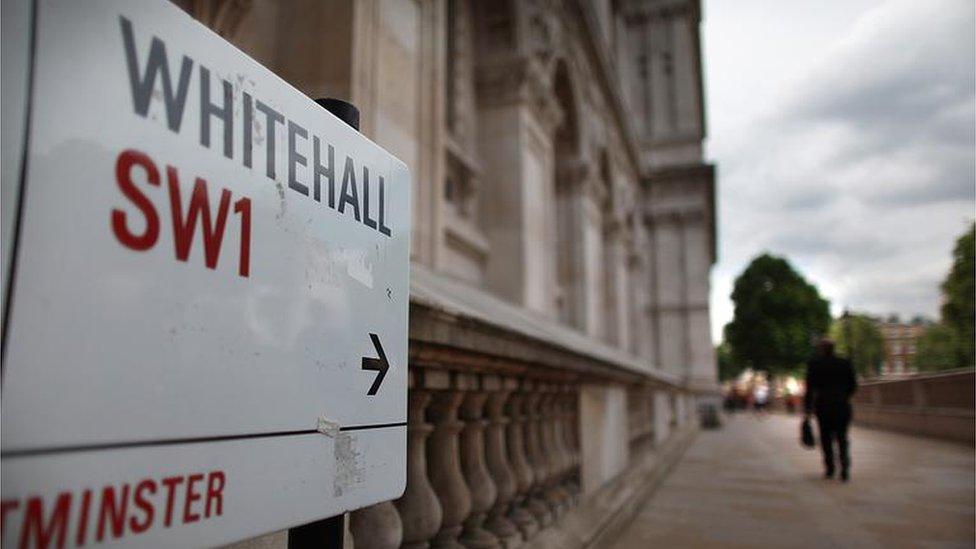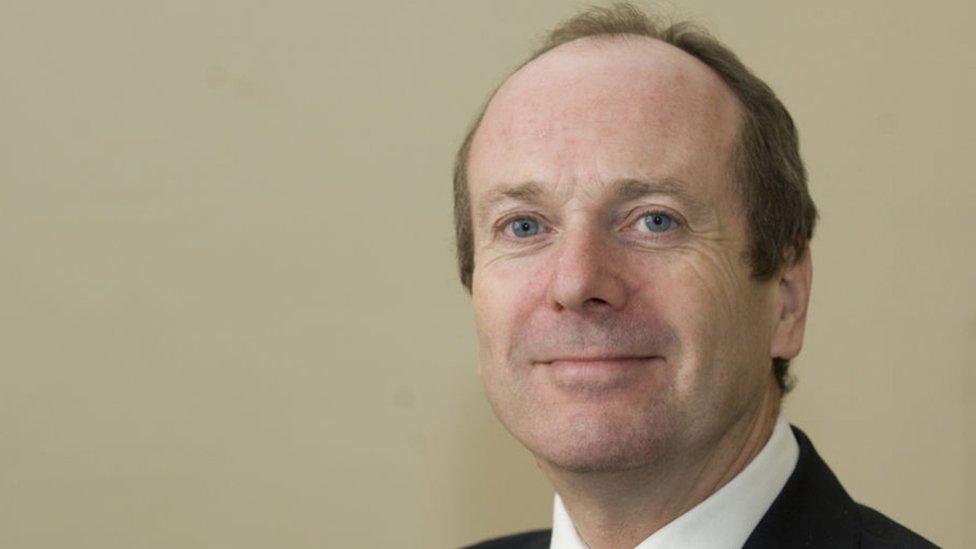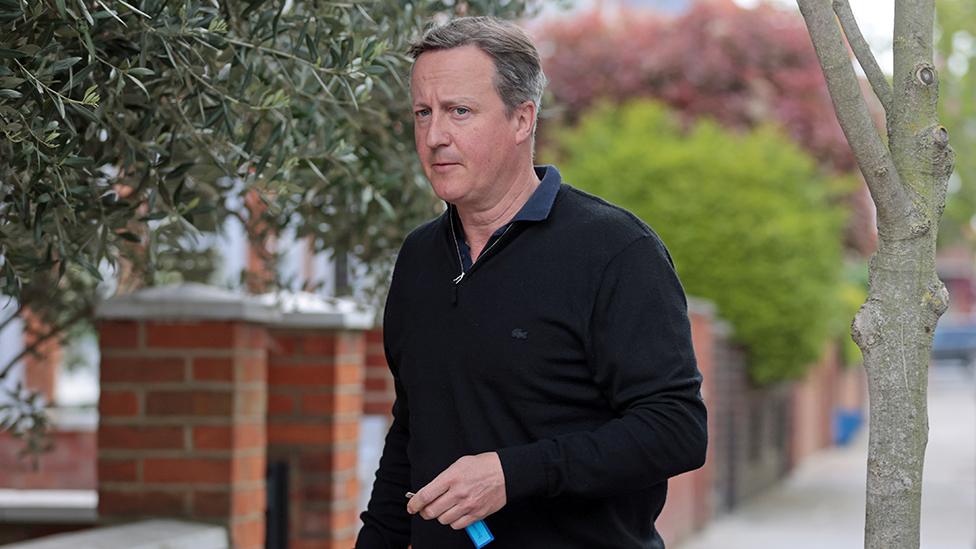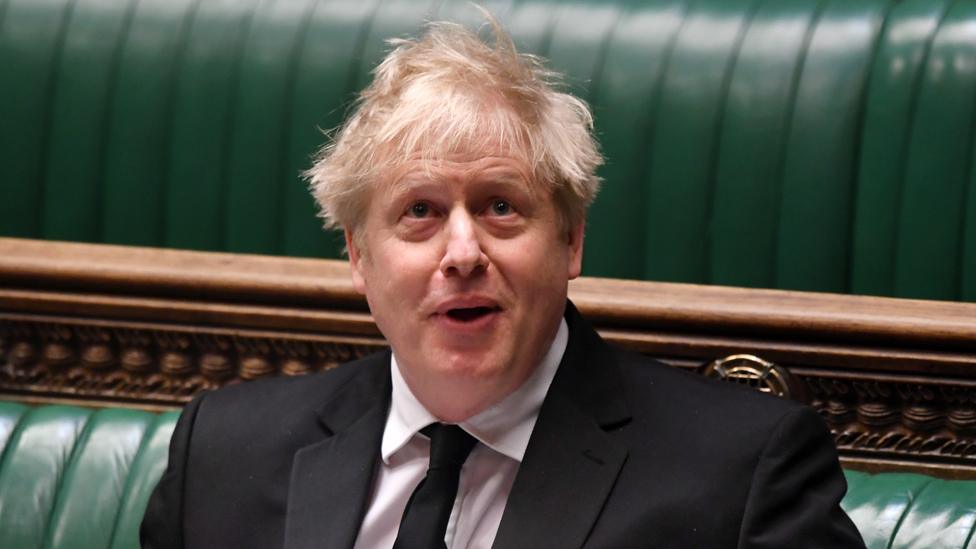Greensill: No boundaries between civil service and private sector, watchdog warns
- Published
Lord Pickles: "I hope this doesn't sound rude, but there doesn't seem to have been any boundaries at all"
The rules on ministers and top officials taking jobs with private firms need urgent reform, the government's adviser on them has said.
Lord Pickles said there did not appear to be "any boundaries at all" between civil servants and the private sector.
It comes after news a top civil servant worked for Greensill Capital while still on the government payroll.
Labour says things are becoming "murkier" and lobbyists have an "open door" to government.
Greensill Capital is at the centre of a row about access, influence and lobbying that has engulfed Westminster.
The government has announced a review of contacts between top officials and ministers, including former prime minister David Cameron, and the now failed finance firm.
It will be led by Nigel Boardman, a non-executive board member of the department for business.
Scandal
Speaking on a visit to Dartmouth College in Devon, Boris Johnson said he agreed with Lord Pickles that reform was needed.
The PM said: "I think the most important thing is for us to get to the bottom of it properly and I want all ministers and civil servants to be making the information that needs to be known known to Mr Boardman and let's see what he has to say.
"We need to understand what's gone on here."
Lobbying row: PM Johnson says we must "get to the bottom of it"
On Wednesday, Mr Johnson ordered Conservative MPs to vote down Labour's call for a "full" MP-led inquiry into Greensill and lobbying more widely.
Tory peer Lord Pickles chairs the Advisory Committee on Business Appointments (Acoba) which advises former ministers and civil servants on outside employment.
He told the Commons public administration committee he had warned of a scandal but "this is not where I expected it to come from".
He added: "There is nothing wrong with lobbyists. What is wrong is with unregulated lobbying, secret lobbying - people getting an undue advantage.
"Our entire political careers have been built by lobbying of some sort... it becomes wrong when it is not properly regulated, recorded and transparent."

Analysis

Former ministers and senior civil servants must seek advice before taking up a new job in the two years after they leave Whitehall
By political reporter Brian Wheeler
Former government ministers - and top civil servants - are never short of job offers, but what sort of work should they be allowed to do after leaving the corridors of power?
Lord Pickles' Acoba committee is meant to ensure that they don't use their insider knowledge and contacts to enrich themselves for two years after leaving the government.
The danger is that if they get too cosy with business it could lead to bias and corruption.
The Acoba committee has long been criticised for being toothless - and Eric Pickles appears to agree. As things stand, he is neither a watchdog nor a regulator, he says.
His committee is there to offer advice, which is not always sought.
He appears determined to change this, although he says there is no need for the "thermonuclear" option of fines and new laws.
Only that if you break the rules, there must be "consequences".

On Tuesday it emerged that a former government procurement officer, Bill Crothers, joined Greensill as an adviser in 2015 while still working as a civil servant - after getting the go-ahead from the Cabinet Office.
Lord Pickles said that while it was not unusual for civil servants to have second jobs and to share their expertise, Mr Crothers' "excuse" when justifying his work with Greensill surprised him.
"It did seem, talking to other colleagues who had enjoyed being civil servants in the past, that they also shared my surprise - this seems to be a new thing, or a new excuse."

Bill Crothers says he was "transparent" about the role he took on with Greensill Capital
He said contractors and consultants to the government should have to sign a memorandum of understanding about the restrictions that would be placed on them after completing their public sector work.
"Simple steps could be taken now" he said to tighten things up including "looking carefully at contracts of employment" and changes could be put in place "well before the summer".
'Milk round'
He said the public was "entitled" to know the arrangements for second jobs.
"I mean, if Mr Crothers had decided he wanted to have a milk round or something, I don't think we would be terribly worried.
"But his particular position, in terms of running procurement and working for a commercial organisation, is something that does require a full and frank and transparent explanation," he added.
He expressed his frustration that Acoba had a "very limited and defined role," but added that most people do follow the rules and it is "only a tiny minority" who cause problems.

What inquiries are being held?
Government-commissioned review to report by the end of June will include David Cameron's role and how senior civil servant Bill Crothers was given permission to work for Greensill while on the government payroll
The head of the civil service, Simon Case, has ordered all government departments to disclose senior staff with second jobs and outside interests by the end of the week
Treasury Select Committee announced investigation into Greensill Capital on Tuesday with details set out next week
Public Administration and Constitutional Affairs Committee has just announced its own inquiry in to "topical issues arising around Greensill"
Committee on Standards in public life looking at the wider issues
Cabinet Office review of the Lobbying Act, launched before the Greensill row, will take it into account
Committee on Standards in Public Life
Commons public accounts committee is also looking into Greensill controversy

It was possible to create a "robust system" without spending "enormous sums" of money and creating layers of bureaucracy, Lord Pickles told MPs.
Labour leader Sir Keir Starmer said more and stronger lobbying rules are needed because the current system "is not working".
He said ministers were being lobbied for "massive" procurement contracts "involving millions sometimes billions of pounds".
Opposition leader Keir Starmer describes a "murkier and murkier picture" over lobbying practices
He added: "Increasingly we're seeing a murkier and murkier picture whether it's the way contracts are handed out, the lack of due process or the lobbying which is not a revolving door, it's an open door now in to government".
Correction 27/4/21: Lord Pickles' quote regarding lobbying has been corrected
- Published9 August 2021

- Published14 April 2021
